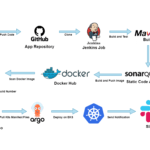Understanding the Importance of Behavioral Questions
Behavioral questions hold a pivotal role in DevOps interviews as they delve beyond technical prowess, offering a comprehensive evaluation of a candidate’s soft skills, problem-solving capabilities, and compatibility with the team culture. These questions are designed to shed light on how candidates have handled real-world scenarios in the past, thereby providing a predictive measure of how they might perform in future situations. In an environment where collaboration, continuous improvement, and adaptability are key, understanding a candidate’s behavioral tendencies is crucial.
One of the main reasons behavioral questions are so critical is their ability to reveal a candidate’s soft skills. In the context of DevOps, soft skills such as communication, teamwork, and leadership are just as important as technical knowledge. For instance, a question like, “Can you describe a time when you had to resolve a conflict within your team?” can provide insight into a candidate’s interpersonal skills and their approach to conflict resolution. This is particularly important in a DevOps setting, where seamless collaboration between development and operations teams is essential for successful project delivery.
Furthermore, behavioral questions can highlight a candidate’s problem-solving abilities. DevOps professionals often face complex challenges that require not just technical expertise but also innovative thinking and resilience. Questions such as, “Tell me about a time when you faced a significant technical challenge and how you overcame it,” allow interviewers to gauge a candidate’s critical thinking and their capacity to navigate obstacles. This insight is invaluable for roles that demand quick, yet effective, problem resolution.
Lastly, these questions help in assessing cultural fit within the team. DevOps environments thrive on a shared philosophy of continuous improvement, mutual respect, and a commitment to common goals. Behavioral questions can reveal whether a candidate’s values align with the organization’s culture, which is vital for fostering a productive and harmonious work environment. By understanding past behaviors and experiences, interviewers can better determine if a candidate will contribute positively to the team’s dynamics.
Common Behavioral Questions in DevOps Interviews
Behavioral questions are a staple in DevOps interviews, as they reveal a candidate’s ability to handle real-world challenges and collaborate effectively within a team. One frequently asked question is, “Tell me about a time you had to handle a critical production issue.” Interviewers ask this question to gauge your problem-solving skills and your ability to remain calm under pressure. A strong response should include a specific example, detailing the issue, the steps you took to resolve it, and the outcome. Emphasizing your methodical approach and communication during the crisis will demonstrate your capability to manage similar situations in the future.
Another common question is, “Describe a situation where you had to collaborate with a difficult team member.” This question aims to assess your interpersonal skills, particularly your ability to work with diverse personalities. When answering, it is crucial to focus on the strategies you employed to overcome the difficulties and achieve a successful collaboration. Highlighting your empathy, active listening, and compromise skills can illustrate your readiness to foster a positive team environment, which is essential in DevOps roles.
Interviewers may also ask, “How do you manage stress during high-pressure situations?” This question is designed to evaluate your stress management techniques and overall resilience. A well-rounded answer should include specific methods you use to stay focused and composed, such as time management, prioritization, or mindfulness practices. Additionally, illustrating how you have applied these techniques in past high-pressure scenarios can provide concrete evidence of your capability to handle stress effectively.
Understanding the rationale behind these questions and preparing thoughtful, structured responses can significantly enhance your performance in a DevOps interview. By showcasing your problem-solving abilities, collaboration skills, and stress management strategies, you can demonstrate your suitability for the demanding and dynamic nature of DevOps roles.
Crafting Effective Responses Using the STAR Method
The STAR (Situation, Task, Action, Result) method is a powerful framework for structuring responses to behavioral questions in DevOps interviews. It helps candidates articulate their experiences clearly and concisely, ensuring that each response is comprehensive and relevant. Understanding each component of the STAR method is crucial for mastering this technique.
Situation: Begin by setting the context for your story. Describe a specific event or challenge you encountered in your previous role. For example, “In my last position as a DevOps engineer, our team faced a significant issue with deployment pipelines frequently failing.”
Task: Outline your specific responsibilities or the objective you needed to achieve in that situation. This step helps interviewers understand your role and the expectations placed upon you. For instance, “My task was to identify the root cause of the pipeline failures and implement a solution to enhance the stability of our deployment process.”
Action: Detail the steps you took to address the situation. This part should highlight your problem-solving skills and the actions you personally contributed. Avoid being vague; specificity is key. An example could be, “I conducted a thorough analysis of the deployment logs and identified that the failures were due to inconsistent environment configurations. I then developed a script to standardize these configurations across all environments, ensuring consistency.”
Result: Conclude by explaining the outcome of your actions. Quantify your success wherever possible to provide a clear picture of your impact. For instance, “As a result, the deployment pipeline’s failure rate decreased by 40%, leading to more reliable releases and improved team productivity.”
To avoid common pitfalls, ensure your responses are neither too vague nor overly detailed. Striking the right balance is essential; provide enough context to make your story understandable, but keep it concise to maintain the interviewer’s interest. Practicing your responses using the STAR method can help you deliver compelling and precise answers, showcasing your capabilities effectively in any DevOps interview.
Tips and Strategies for Practicing Behavioral Questions
Preparing for behavioral questions in a DevOps interview requires a strategic approach to demonstrate both technical proficiency and interpersonal skills. One of the most effective techniques is to engage in mock interviews. Simulate the interview environment with a colleague or mentor who can ask you a series of behavioral questions. This practice will help you become more comfortable with the format and hone your ability to articulate responses concisely and confidently.
Recording oneself during these mock interviews can provide invaluable insights. By reviewing the recordings, you can identify areas for improvement, such as body language, tone, and clarity of speech. This self-assessment enables you to make necessary adjustments before the actual interview.
Seeking feedback from peers or mentors is another critical strategy. Constructive criticism from others can highlight aspects you may have overlooked, helping you refine your answers. Whether it’s about the depth of your responses or the examples chosen, external feedback can offer a fresh perspective that enhances your preparedness.
In addition to practicing responses, researching the company culture and specific job requirements is essential. Understanding the organization’s values, mission, and work environment allows you to tailor your answers to align with what the company is looking for in a candidate. This targeted approach not only showcases your interest in the company but also demonstrates your readiness to fit into their team dynamics.
To further bolster your preparation, consider utilizing various resources designed to improve behavioral interviewing skills. Books like “Cracking the Coding Interview” by Gayle Laakmann McDowell and “The DevOps Handbook” by Gene Kim, Patrick Debois, John Willis, and Jez Humble offer valuable insights. Additionally, online courses on platforms like Coursera and Udemy can provide structured learning and practice exercises to enhance your readiness.
By combining these tips and strategies, you can approach your DevOps interview with confidence, equipped to handle behavioral questions effectively and leave a lasting positive impression.



